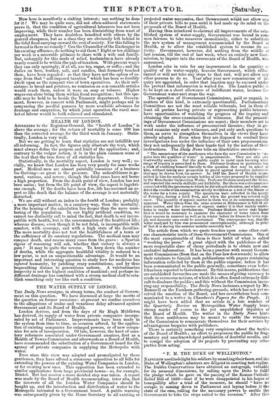HEALTH OF LONDON.
Accoamare to the Registrar-General, the "health of London" is above the average ; for the return of mortality is some 100 less than the corrected average for the third week in January. Statistically, London is very well.
But we are getting to learn that statistics are not infallible nor all-informing. In fact, the figures only illustrate the text, which must always define the purpose and limit of the application ; and, contrary to the vulgar notion it is in the plain common sense of the text that the true force of! all statistics lies.
Statistically, in the mortality aspect, London is very well; socially, we know that London has beeo very poorly for some weeks past. Medical men axe almost painfully conscious of a business too thriving—so great is the pressure. The unhealthiness is general, various, and severe ; though the fatal eases have not -borne a high proportion. From the death point of view, London has not been amiss ; but from the life point of view, the aspect is lugubrious enough. If the deaths have been few, life has assumed an &s et so like death that the balance of the average is not materially disturbed.
\ We are still without an index to the health, of London; probably a more important matter, in a sanatory way, than the mortality. For the bearing of the calculation lies deeper than the mere numbering of the population. In our highly artificial condition, we cannot too distinctly call to mind the fact, that death is nog incompatible with health, but is the consummation of the healthiest life; whereas disease, even though it be not fatal, is incompatible with comfort, with economy, and with a high state of the faculties. The mere mortality does not test the healthfulness of a town er the sufficiency of its sanatory regulations. The medical-man may conquer death, and rescue many cases from the grave : a Spartan rigour of reasoning will ask, whether that victory is always a. gam P It may be quite the reverse. To keep down the number of deaths, while the aggregate healthful vitality is reduced to a low point, is not an unquestionable advantage. It would be an important and interesting question to study how far medicine has injured humanity, by patching crazy constitutions, and by thus bequeathing disease to generations unborn. A valetudinarian longevity is not the highest condition of mankind ; and perhaps indifferent drainage has combined with a strong medical staff to establish something only too like such a condition.


























 Previous page
Previous page